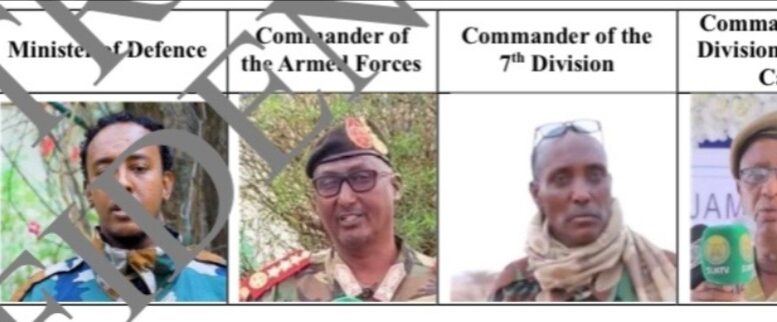Nairobi – A confidential report by U.N Panel of Experts investigating the conflict in Las Anod, a city in northern Somalila, has identified several key individuals involved in the months-long bloody fighting between Somaliland troops and SSC-Khatuma forces which killed hundreds and displaced more than 200,000 from their homes.
The report obtained by Horn Examiner, the experts said they have also gathered evidence of potential violations of International Humanitarian Law and international human rights law during the conflict.
The report by the Panel which was submitted to the United Nations Security Council identified the four individual, including three senior military commanders as actively engaged in and/or overseeing operational elements of the fighting.
Among the key actors identified in the panel report are:
1 – Abdiqani Mohamoud Ateye Farid: Somaliland Minister of Defence.
2 – General Abdi Abdilahi (Abdi Dheere): Operational Commander of the Somaliland’s Army.
3 – General Faisal Abdi Butaan: Commander of the 7th Division and responsible for operations in Las Anod.
4 – Colonel Ibrahim Ashkir: Commander of the 10th Division stationed at Gooje Adde, a military base in the northeast of Las Anod.
The panel is also investigating the origin of weapons and ammunition used in the conflict and whether these weapons were supplied to the parties in violation of the arms embargo on Somalia imposed by resolution 733 (1992), or if they were diverted from the Federal Government of Somalia’s arsenals due to a lack of accountability in the weapons and ammunition management system.
According to the report labeled as ‘Strictly Confidential,’ footage obtained by the Panel from Las Anod inhabitants shows debris of medium-caliber munitions and damage to civilian buildings caused by indirect attacks using light and medium mortars and rockets.
The Panel of Experts said it intends to trace specific items to identify the chain of custody, including ammunition boxes marked from the Defence Engineering Industry Corporation in Addis Ababa, Ethiopia and various types of rocket launchers and shells.
The Panel also noted the presence of unexploded ordnance (UXO), including mortars and rockets without contact fuses.
“Further investigation will be conducted to determine the reasons behind the absence of fuses on these projectiles.” the Panel said in their report.
Regarding violations of International Humanitarian Law (IHL) and International Human Rights Law (IHRL), the Panel has gathered evidence of several episodes in which explosive projectiles were used against civilian objects, including hospitals and mosques in Las Anod. The most serious incident involved the alleged shelling by Somaliland forces of the Regional Hospital of Las Anod on February 28, 2023.
RECOMMENDATIONS
Based on their findings, the Panel has provided their recommendations and suggest that the Council issue a press release highlighting the possibility of designating individuals involved in IHL violations in Las Anod under resolution 1844 (2008) and subsequent resolutions.
The Council is also urged by the panel of experts to write to UNSOM (United Nations Assistance Mission in Somalia) and UNMAS (United Nations Mine Action Service) to facilitate a combined UN mission to Las Anod.
This Mission would assist in identifying weapons and initiating the tracing of Somaliland’s weapons, ammunition, and related materials used in the conflict.
Additionally, the Panel encouraged the Council to contact Somaliland authorities, urging them to grant access to Las Anod for humanitarian agencies and explosive ordnance disposal teams, such as UNMAS and the Halo Trust.
According to the report, the Panel’s investigation and recommendations aim to address the violations of international law and promote peace and stability in Las Anod and the surrounding region.
Discover more from Idil News
Subscribe to get the latest posts sent to your email.


